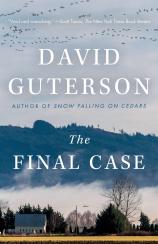The Final Case
Review
The Final Case
At the beginning of THE FINAL CASE, the novelist narrator informs us that he is through with fiction and is fine with it. He busies himself with home maintenance, reading, and loving his wife, Alison, and he has gotten over the feeling that something is wrong if he is not writing. So when the narrator's 83-year-old father, Royal, wrecks his car and needs a ride downtown to his law firm office, he is happy to oblige.
The prologue has established that Royal is one of the good ones by relating an early case of his where he maintained contact with a client over decades and collected and turned over a life insurance policy to her, all without being paid a cent himself. And if that’s not enough, he carries around his own bran flakes in his briefcase.
"In presenting both his family’s thoughtful decency and the Harveys’ utterly repellent behavior, THE FINAL CASE illustrates an astonishing range of morality. It will stay with you long after you turn the last page."
Royal explains to his son that he is not as busy as he’d like to be, but he’s happier coming to the office every day. “I’ve always said that when the time comes I’d like to drop dead in the middle of a closing speech to a jury, but the odds are against that,” he says. Then the phone rings, asking if he would consider representing the wife of a couple in Skagit County who have been arrested for homicide by neglect.
Fundamental Christians Betsy and Delvin Harvey adopted a girl from Ethiopia. Although she’d had a hard life, Abeba wasn’t amenable to their fanatical childrearing methods and ultimately died of hypothermia in their backyard. Royal agrees to represent Betsy, even though he suspects she is guilty, because he believes in due process: “If you convict someone because they’re abhorrent, and not because they broke the law, you might as well live in a dictatorship.”
The narrator helps his father investigate the case, becoming embroiled in the ugly facts and the ugly thinking that paved the way for the facts. Through it all, we begin to feel the same respect for Royal that his son does, and when he suffers a stroke, we also feel the loss. While the novel is billed as a legal thriller, it is also an exploration of the bonds and rituals of family, and how to achieve a life well-lived.
David Guterson’s writing is as nuanced and beautiful as ever, especially as the narrator describes his wife, older sister and mother. These women come alive in their strength, intelligence and humor. You might think there is no way that meeting one’s spouse in the midst of an earthquake in a museum in Vancouver, BC could be anything more than a “meet cute” tale, but you would be wrong.
Alison emerges as a fresh, sly character well equipped to supply esoteric Japanese death poetry, as well as practical advice. His sister, Danielle, owns and runs a tea shop that serves as a backdrop for many a philosophical and/or literary discussion. Its customers spout theories, rants and passionate polemics over their oolong tea. A bitter young wanna-be novelist proclaims to the narrator that anything he writes will be dismissed because it comes from a white male. On the day she quits, one of the workers tells the other exactly what she thinks of her. And Danielle goes on erasing and replacing the latest literary quote on the chalkboard.
But despite the rich forays into characterization, the novel is framed by a son’s love for his father. Late in the book, the narrator reflects on Philip Roth’s apparent guilt in presenting his father’s aging and death in PATRIMONY and wonders if it’s mitigated by keeping the man alive in print: “Even as a shade, the father goes on haunting the son --- not just the son’s dreams but his texts.”
In presenting both his family’s thoughtful decency and the Harveys’ utterly repellent behavior, THE FINAL CASE illustrates an astonishing range of morality. It will stay with you long after you turn the last page.
Reviewed by Eileen Zimmerman Nicol on January 14, 2022
The Final Case
- Publication Date: November 29, 2022
- Genres: Fiction, Literary Fiction, Suspense, Thriller
- Paperback: 272 pages
- Publisher: Vintage
- ISBN-10: 0525563113
- ISBN-13: 9780525563112




